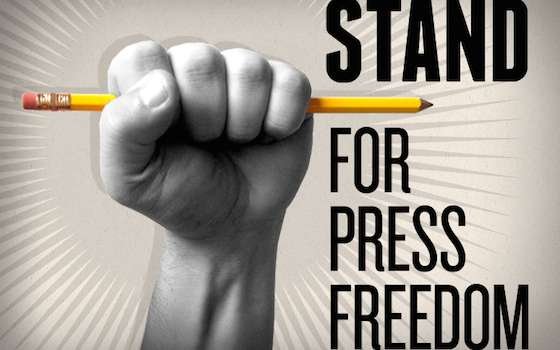- MENU
- HOME
- SEARCH
- WORLD
- MAIN
- AFRICA
- ASIA
- BALKANS
- EUROPE
- LATIN AMERICA
- MIDDLE EAST
- United Kingdom
- United States
- Argentina
- Australia
- Austria
- Benelux
- Brazil
- Canada
- China
- France
- Germany
- Greece
- Hungary
- India
- Indonesia
- Ireland
- Israel
- Italy
- Japan
- Korea
- Mexico
- New Zealand
- Pakistan
- Philippines
- Poland
- Russia
- South Africa
- Spain
- Taiwan
- Turkey
- USA
- BUSINESS
- WEALTH
- STOCKS
- TECH
- HEALTH
- LIFESTYLE
- ENTERTAINMENT
- SPORTS
- RSS
- iHaveNet.com

by Jules Witcover
The Pulitzer Prizes to two news outlets that cooperated with whistleblower
With the exiled Snowden harbored in
Not surprisingly, Snowden called the awards "a vindication for everyone who believes that the public has a role in government." He hailed his collaborators, chiefly
The public-service awards to the two news outlets came amid continuing clamor from some government sources for the arrest, extradition and prosecution of Snowden, ignored to date by
But the Pulitzer committee, comprised of leading American newspaper editors and officials, once again took an emphatic position in the cause of the public's right to know what its officialdom is doing in secret in its name. Gellman said his team "consulted with the responsible officials on every story and held back operational details. But we were not prepared to withhold the secret policy decision the government is making for us and surveillance it's directing against us."
The awards marked the second major instance of the Pulitzer public-service citations going to newspapers for disclosure of critical classified materials in the national security field. In 1972, the
This year's prizes came on the heels of
The
Feinstein's only comment on the
Her committee earlier this month moved by an 11-3 vote to send its report to the executive branch for declassification review. If and when it is declassified and released, it seems certain to trigger another round of public debate on the NSA and CIA secret practices in this burgeoning surveillance scandal.
It is likely as well to resurrect the whole argument about whether waterboarding and other methods of extreme interrogation actually produce information from detainees not obtainable by other methods acceptable under the
In any event, the Pulitzer Prizes in this whole area of national security, while holding no authority in the arena of legality, constitute a resounding statement of approval from the journalism community of its own continuing pursuit of accountability from government on critical matters of public policy.
Whatever
WORLD | AFRICA | ASIA | EUROPE | LATIN AMERICA | MIDDLE EAST | UNITED STATES | ECONOMICS | EDUCATION | ENVIRONMENT | FOREIGN POLICY | POLITICS
Article: Copyright ©, Tribune Content Agency
"Pulitzer Committee Makes Stand for Free Press, Accountable Government "